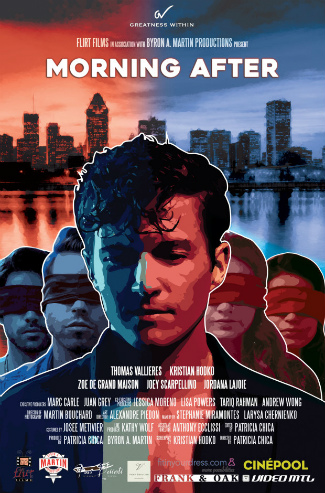 After Michael comes back to Montreal, his good friend throws him a party when sensual games are played and exploration of sexual identity mixes in. As he and the others discover their likings and what they are opened too, things get interesting.
After Michael comes back to Montreal, his good friend throws him a party when sensual games are played and exploration of sexual identity mixes in. As he and the others discover their likings and what they are opened too, things get interesting.
Written by Kristian Hodko and directed by Patricia Chica, Morning After is an exploration of sexual identity and sexual fluidity. The film places no judgments on the characters and what they do following attractions to one another. The film is written in a way that lets the view take a peek into these friends’ lives during one evening/night together. It does not exploit the situation to titillate alone, it shows what is going on which does happen to be sensual and sexy but it also shows these people has humans with feelings and thoughts who also happen to be sexual beings. The characters are built in a way that they feel human and natural. Their conversations and the way their relationships evolve are organic and show attention to details in how they were written.
The cast for the film was clearly carefully chosen for each part as they all needed to have the right chemistry and connection for the film to work. The star of the film, the man at the center of it all, Michael, is played by Thomas Vallieres who does well here and show talent and that he has depth and nuances to what he does, what he puts into his parts, and what he gives to the audience. Shining next to him is Zoé De Grand Maison as Teegan who plays her character shy but open minded, giving her layers of interest. The rest of the cast, composed of writer Hodko as Edward, Joey Scarpellino as Alex, and last but not least Jordana Lajoie as Dana, also gives a lot of to each of their parts, making them their own and creating a believable group of friends.
The film’s setting also helps sell it as the story of a group of friends in Montreal. The apartment and its contents look just the part of a cool place either on Le Plateau or even Saint-Henri. The cast looks right at home in it, which adds to the feeling of just being a fly on the wall in these friends’ evening. This is shot by director of photography Martin Bouchard who creates beautiful images with some shots that look right out of a much more expensive film. For example, the scene on the balcony at night, with the lights and the rain, look fantastic and helps create the feel of the film. The ending shot, as well as a few others, feeling properly “Montreal”.
Another bigger supporting character, if it can be called so, is the music on the film, the score by Vivien Villani with a few carefully selected vocal tracks add a lot to the feel of things, fitting the images, the way it’s shot, and how the story makes the viewer feel. This music shows how to enhance a film with an often overlooked aspect of filmmaking in short films such as this.
Morning After is a chill film about sexual fluidity, friendship, and so much more. It’s the kind of film that each viewer will take something different from and some will not appreciate it. However, it should be seen and given a chance as it has a message that is important and may be something many may not see in their everyday lives. It’s a beautiful looking film made with clear passion and talent from all involved.
